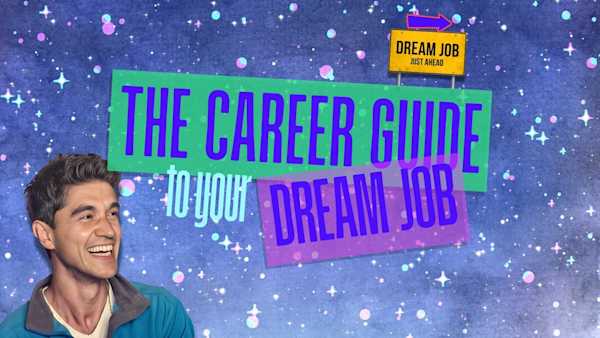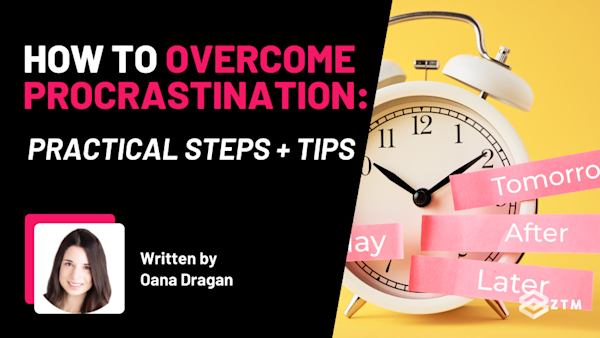This kind of thing happens all the time:
Two new developers join the same company
They have the same role and the same experience
But one earns thousands of dollars more than the other from day one. Simply because they negotiated their offer for a better deal
The problem of course is that most people don’t even try to negotiate because they worry they’ll say the wrong thing or lose the offer altogether.
But negotiation isn’t a confrontation. It’s a conversation. And it’s how you make sure your pay reflects your value, not your nerves. So in this guide, I’ll walk you through what to say before and after the offer comes through.
That way you can start your job on the right foot and at the right salary!
He even covers his specific technique that got him a 90% success rate from interviews to offers!
You can use it too.
With that out of the way, let’s get into this 5-minute guide…
Step #1. Know what you’re worth
I recommend doing this step before you even start applying for roles.
Why?
Well, one of the main reasons people don’t get paid more (other than not asking for more money) is because they don’t know what they’re worth, or what others in their industry are earning.
It's very hard to know if you’re getting a good deal if you don’t know what that amount should be!
So why do this before?
Simply because the conversations around salary will often come up before the offer is ever made. And so by knowing this before then, you can set the tone in advance and anchor a price in their mind.
Smart right?
So start off by checking sites like Glassdoor.com for your role.
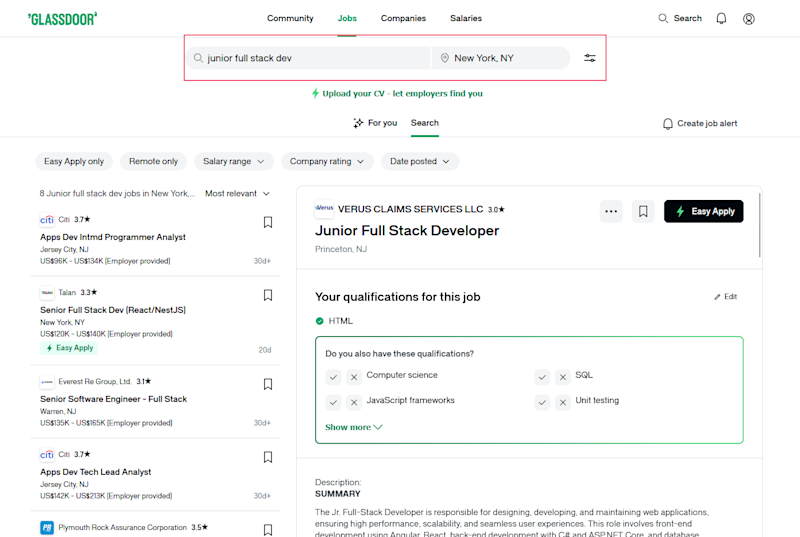
Look up your location first for the average salary, and then check Silicon Valley to see the upper limit.
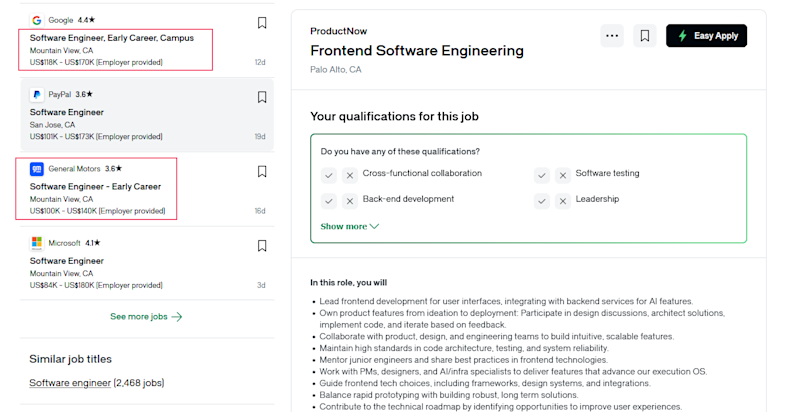
This will give you a realistic range to aim for.
Next, think about what you bring to the table. Maybe you’ve built side projects, contributed to open source, or shipped something real during bootcamps or online courses. These things have value.
Do you have more skills or experience than the average applicant?
Do you actually outskill the role you’re applying for?
For example
Here at ZTM, we have multiple projects that focus on the most important skills in roles, plus cutting-edge trends. This way, most employers are shocked at the projects in our students' portfolios.
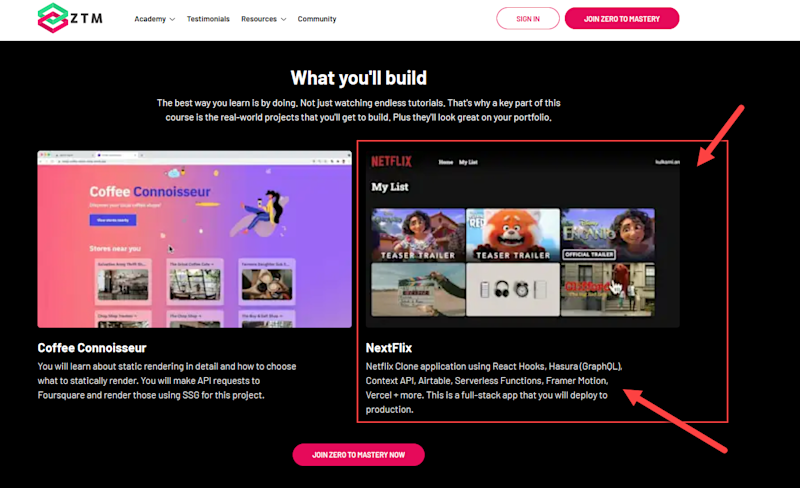
Oh yeah, nothing too fancy. Just a working copy of Netflix!
So what projects do you have?
Bonus points if you’ve customized them also to meet your own goals.
Add $10k
Once you’ve done that, you now have a solid idea of what you want to ask for. However, if your number is below what top earners are asking, go ahead and add $10k to it. (Assuming that doesn’t push you way out of range).
Why add $10k?
Because it’s all a negotiation! And having a higher number to come down from is easier than trying to raise a low number later
People will value you more when you’re not the cheapest option
Also, you’ll be amazed what some companies will pay compared to others. I’ve seen people in my role on double what I earn, with less experience. Simply because what the company was willing to pay
However, there is a bit of nuance to how you ask for this, as you don’t want to seem standoffish or greedy.
That’s why I recommend when they ask for your desired salary, that you start the conversation with something like:
“I see that the average starting salary for this role in Silicon Valley is around X, so that’s probably a good starting point to work from.”
This way, you’re not saying a figure, you’re anchoring the range and value of someone in your role. It also allows them to open up a back and forth dialogue.
Because you’re not saying
“It's this amount or I won’t work here”.
Instead you’re saying this is what these people are paid, so now we can figure out what a good range is for me and my skills.
Then once they’re open to negotiating, sell them on the added value you can bring and then name your number (with that extra $10k added).
Simple!
Step #2. What to do when the first offer arrives
Alright so the first offer has hit your inbox. What now?
Well, if this is your dream salary and benefits package then you could definitely say yes right away and lock this in. Well done on the new job! However, if it’s not quite what you wanted, here’s how to negotiate it to be a little better.
Start off by getting a little breathing room, and let them know you’re interested and thankful for the offer:
“Thanks so much for the offer. I’m really excited about the opportunity and it seems like a great fit. Would it be okay if I take a couple of days to look everything over?”
This helps them know you’re serious and professional but you’re also getting back to them ASAP.
It also gives us some leverage to perhaps get a few other offers or even a better offer from this company. Especially if you’ve been applying for other roles.
All you do is subtly build up some demand by letting them know about these other applications. Again though, it’s all about the nuance. You don’t have to go into detail, but it's just common sense to see what other offers come in before you decide.
So let them know that’s what you’re going to do:
“I’m just in the final stages with a few other companies, and I’d like to have all the information from each company first, and then chat to my partner before making a decision.”
This is a completely normal thing to happen in this industry so they’ll probably be expecting this.
However, we want to make sure we don’t leave it too late. So if they haven’t given you a deadline, go ahead and politely ask when they’d like a response:
“How soon do you need to hear back from me?”
Simple right? Now you’ve bought yourself some time, and leave yourself open to some other offers.
However, rather than just hope and wait, let's fast-track this a little by reaching out to the other companies you applied to…
Step #3. Follow up with other companies you applied to
Assuming you have been interviewing with other companies (even if they’re still mid-process), then this is the moment to let them know you’ve received an offer.
To be clear, the goal here isn’t to pressure anyone. It’s to signal that you’re in demand and to see if they can move faster so you can make a fair comparison.
You can say something like:
“I wanted to let you know I’ve just received another offer, but I’m still really interested in your role. Would it be possible to get an update on next steps or timelines? I’d love to make the best decision once I’ve heard back from everyone.”
This does a lot of heavy lifting because it keeps the tone friendly and respectful, but it also adds a subtle sense of urgency.
Why?
Well tech is always competing for talent, and hiring managers know that good candidates don’t stay available for long. A message like this can really speed things up - especially if the offer is from a direct competitor.
In that case, you can even mention the company name as it adds a lot of clout:
“I’ve received an offer from Meta, but I’m still very interested in what your team is building here at Google. I’d love to make a thoughtful decision once I’ve heard back from everyone.”
For smaller companies, I wouldn’t do this. But for the bigger ones, it’ll help them see you as someone that their competitors want, and everyone wants what they can't have!
Well, usually anyways…
I’ll be honest. It won’t always mean another offer or an immediate reply, but it definitely helps get things moving. More importantly though, you’ve been professional and done your part by keeping them in the loop.
The issue now of course is what do you do if you get another offer after sending out these emails to the other companies?
Heck, what do you do if you get a few of them?
Well let's get into it next.
Step #4. What to do if you get multiple offers
OK so this is the absolute best position to be in. You’ve now got multiple offer options, and may even see another counter offer from the first company.
So how do you choose?
Well, you could just take the one with the highest salary and be done with it. Or, you can weigh up some pros and cons and find the best option for you.
For example
Maybe:
One company pays less, but it's entirely remote and never in the office. You could now work from anywhere and never commute again. That’s a pretty big quality of life change
Or perhaps another has stocks and shares benefits?
Perhaps another has more room for growth so you can push yourself?
Or is it in a slightly better town that you want to move to?
Maybe another company has a better company culture?
Definitely weigh these up before you choose.
I’ve taken roles before with a lower salary, simply due to the other benefits, and there’s nothing wrong with this. After a certain point, your salary increase won’t change your quality of life that much. It’s all the other small things that make the difference.
Then once you’ve decided, it’s time to let everyone know your decision.
Step #5. How to accept or decline gracefully
Go ahead and reply to the desired option then wait 24 hours.
“I really appreciate the offer and I’m excited to accept. I’m looking forward to joining the team and getting started.”
Why wait before replying to the others? Simply because if something goes wrong and the offer falls through, you don’t want to turn down the other options.
So wait a day. Then once you hear back and have it locked in, it's time to reach out and let the others know you’ve made your decision.
Again this is all just about being professional. There is a chance you get a better counter offer through, but that’s not really our goal here. Instead we just want to be professional and let the recruiters know, and not burn any bridges, because a polite, clear note keeps doors open for the future.
You could say:
“Thank you again for the offer. I truly appreciate the time and effort your team put into the process. After careful consideration, I’ve decided to move forward with another opportunity that’s a better fit for me right now.”
That’s it. Short, respectful, and leaves everyone feeling positive.
Hiring managers talk and recruiters move between companies. The person you decline today might reach out with a dream opportunity a few years from now. So always leave a good impression, no matter which way you go.
Then once you’ve sent the emails, take a moment to celebrate!
Negotiation can feel stressful, but you’ve just done something most people never even try. You stood up for your value, handled the process professionally, and probably improved your offer in the process.
Hell yeah! Go you!
It’s time to get paid what you're worth
So as you can see, negotiating a higher salary offer isn’t just about pushing for more. It’s about knowing what you’re worth and making sure you’re being paid fairly for the value you bring.
So many people skip doing this out of fear, and trust me I get it. But recruiters will respect you more when you have the skills and know what you can bring to the table.
Share the value you can bring and help them see it, because this is the sign of a professional.
Now go get that higher salary and good luck with your job applications!
P.S.
Remember, I’ve only scratched the surface here. If you want to deep dive into everything around getting hired and landing your dream tech job, then check out Andrei’s new course:
As a ZTM member, you’ll get access to this as well as every other tech training in our course library. So you can smash out new projects, pick up new skills, and move into a senior role faster.
Better still?
You’ll also have access to our private Discord community:
Here you can ask questions of your course instructors, as well as chat with other students and working tech professionals.
Best articles. Best resources. Only for ZTM subscribers.
If you enjoyed this post and want to get more like it in the future, subscribe below. By joining the ZTM community of over 100,000 developers you’ll receive Web Developer Monthly (the fastest growing monthly newsletter for developers) and other exclusive ZTM posts, opportunities and offers.
No spam ever, unsubscribe anytime

